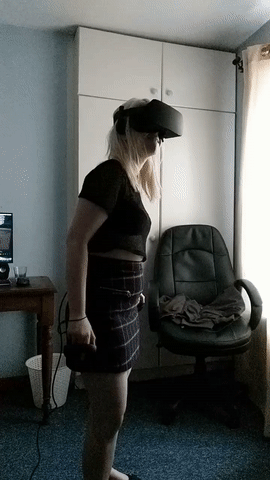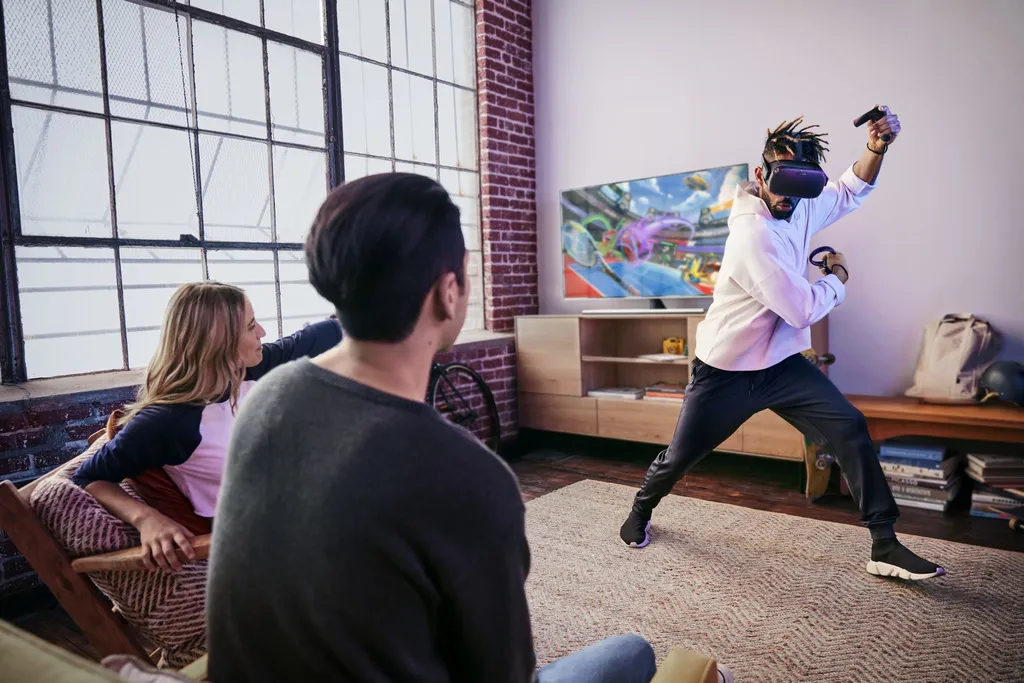Like many virtual reality enthusiasts, I demo my headset to everyone I can. If a friend, family member, colleague or acquaintance is over and hasn’t experienced VR before- I offer them to try my Rift.

I always start them off with Oculus First Contact. What makes it such a great introductory experience is that it teaches you how to use the Touch controllers without even seeming like a tutorial.
After this if they’re a gamer I’ll put them in Superhot VR. If not, I’ll go for Beat Saber then Job Simulator.
Room Scale Is Incredible, People Want It
The reaction upon taking off the headset is unanimous: shock and amazement. I hear statements such as “that was the most incredible thing I’ve ever tried.” VR headsets are real, you can get one, and it’s amazing.
They don’t complain about the graphical fidelity. They don’t say they wished the resolution was higher, or the field of view. The technology is good enough. Their next question, almost always, is “so how much does one cost?”
When I reply “well it’s £399” (now £349), I see their eyes light up, the thought of purchasing entering their mind. That’s a steep price for most people, but it’s just within the realm of affordability. However when I actually finish the sentence, their expression changes. A distinct look of disappointment sweeps across their face. They’re not interested in buying VR anymore- at least not yet.
Why? Because I had to end the sentence with “but it requires a gaming computer, and that’s around £700 minimum”.
Most People Don’t Want a PC
Most people I know aren’t tech enthusiasts, they’re just regular users. Hearing their perspective gives me valuable insight on how technology is viewed outside our enthusiast’s bubble.
If there’s one thing that’s clear, it’s that they have absolutely no desire to own a gaming computer. In fact, most don’t want to own a desktop PC at all.
The consumer technology landscape has changed irrevocably in the past 20 years. Our devices today are sleek, portable, and aesthetically pleasing. The smartphone is now the primary computing device. For tasks that need a full sized keyboard like word processing, a thin laptop or tablet is the tool of choice.
As much as I love my bulky black box with flashing lights and whirring fans- most people I demo to don’t share that feeling.
No matter how compelling it is, and no matter how cheap the headsets become, VR simply doesn’t interest the masses until it’s standalone.
The Graphics Don’t Matter
Quest is significantly less powerful than a gaming PC. It won’t come close in graphical fidelity. But that doesn’t matter. The magic of room scale VR is the interactivity it provides and the new gameplay that interactivity opens up.
No-one plays Superhot and says they wish it looked like Mirror’s Edge. I’ve never heard anyone in the thrill of a paintball battle in Rec Room complain that they aren’t having fun because it doesn’t look like Battlefield. And when bullets rush past in Dead and Buried, no-one sweats and ducks any less because it doesn’t look like Read Dead Redemption.
Are there games that truly depend on a PC’s performance to work? Sure. But not enough to justify the enormous cost of a gaming PC, and none that come close to being a killer app for VR.
“Consumers Won’t Understand The Importance of 6DoF” Debunked
A common argument I’ve seen made against Quest is that consumers won’t buy it because they won’t understand the advantage of 6DoF over 3DoF alternatives. Those who make this case point to the flood of low cost 3DoF VR headsets in retailers like Amazon and Walmart. When little Timmy asks for VR for Christmas his parents will just get him a Go, they say.
But this fundamentally misunderstands why people buy gaming devices- remember, Quest is being marketed as a console. Beat Saber and Superhot VR aren’t on 3DoF platforms. The reason is of course because their gameplay relies on 6DoF controllers. But consumers don’t need to understand this reasoning. All they need to know, and all many will know, is that if they want to play these major VR games, they need a Quest.
Like has been the case for over 30 years, the purchasing decision will be made based on the games available for the hardware- they don’t need to know the specs at all.
Conclusion
In my experience, far more people are interested in purchasing room scale VR than own a gaming PC. And that interest isn’t in graphical fidelity, it’s in the experience.
To restrict the magic of 6DoF VR to the niche of PC gaming would strangle VR’s potential for growth for reasons few people find important. Oculus Quest is exactly what VR needs.






























